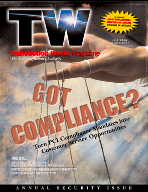| Master the Art of Delivering An Effective Report
Whether you're in a sales or staff meeting, a board or committee meeting, do yourself and everyone a favor by mastering the technique of giving your oral report. This vital form of speaking is often abused, and the ensuing results diminish you and your organization.
Learn to give an effective report!
An effectively delivered report conveys vital information: it can summarize research or past accomplishments, isolate or focus listeners upon key issues and leave everyone briefed and poised to act. An ineffective report confuses listeners, muddles situations and wastes everyone's time. Bad report giving also reflects poorly on your communication skills and judgment. It’s a signal to all you're not ready for prime time. Whether you're winging it or just betrayed by a lack of organization, poor report giving creates a blemish on your communication report card. Don't be "held back" by poor report giving.
Time and Place Dictate Report Length and Style
Take your cues on report giving from your meeting's leader, the agenda and past practices. Many meetings used timed agendas. Find out in advance how much time will be accorded for your report. Is yours a two-minute report? Three minutes? Five minutes? Know your organization's report protocols.
For Example:
- Do you stand or sit while giving yours?
- Do you speak from the front of the room? Behind a lectern?
- Are visuals like a PowerPoint slide presentation or your supporting documentation expected to accompany (or precede) your verbal report?
- Should you expect and allow time for questions and answers (Q&A)?
- Are you expected to use a microphone?
Prepare Your Report
Just because your report is spoken doesn't mean you shouldn't prepare as you would for a written report. Outline it. Begin with the end in mind. What is the purpose of your report? To receive approval? Obtain funding? Warn of doom and gloom ahead? Is yours a briefing or status report? A summary report? Each may employ a different format and certainly a different tone.
Consider using one of several common formats, which is popular for written as well as oral reports:
PAPER format: Emphasizes directness
PURPOSE or PROBLEM: Information about why you are speaking.
ACTION: Action you plan to take, OR Action you request.
PARTICULARS: The who, when, where, why, how and how much. Share details here.
EVIDENCE: Optional section wherein you cite or reference documentation.
REQUEST for RESPONSE: What Next? Be Specific!
PRESS format: Builds your case
PURPOSE or Problem: Information about why you are speaking
REASON for suggestion: Information about the subject.
EXAMPLE or Evidence: Information that supports your statements.
SOLUTION: Remedies, solutions, suggestions, ideas, plans, actions already taken.
SUPPORTING Material: Handouts of documents the reader will need or want.
GRACE format: Good for garnering support
GREETING: Be pleasant and positive.
RESTATEMENT of the Problem: Ensures everyone understand the situation.
ACTION: What actions are you taking / have you taken?
CONCLUSIONS drawn: As a result of the aforementioned information, what will you do?
EGG on your listener: What Next? Be Specific! What will you do? What do you need? State it.
Stand (or Sit) and Deliver!
Effective report giving involves more than choosing the right words. It involves credible and compelling delivery. Follow these tips to enhance your report.
- Identify yourself by name and title in case others don’t know you
(especially on conference calls).
- Speak confidently.
- Enunciate.
- Project your voice so all can hear.
- Give good eye contact to each participant.
- Use shorter, powerful statements.
- Avoid "tag" sentences (declarative sentences turned into questions), tentative language and qualifying statements which diminish the strength of your words.
- Clearly state what you want!
- Clearly state what you need!
- Summarize.
- Use handouts to convey both summary and detailed information.
- Stand Up, Speak Up, Sit Down.
Tips for Improving Your Report Card
Successfully delivering an oral report, like giving a speech, is done best after rehearsing.
- Practice giving your report in front of a mirror first
- Use a timing device to gauge how long it takes. Modify accordingly
- Craft a strong opening statement
- Consider a powerful concluding statement too.
- Practice giving your report in front of a mirror first.
- You can also practice in front of your cat, dog or bird (but think twice about rehearsing in front of your parakeet.)
- Next, practice by calling your home answering machine, then listening to where you sound confident, where you sound tentative and where you meander
- Find a local Toastmasters club (www.toastmasters.org) for weekly opportunities to give reports, deliver short speeches and learn to speak off-the-cuff.
- Ask a trusted colleague to critique your actual report privately for feedback on how your performance was perceived by others.
Ace Your Report (Card)!
Every form of communication has its prescribed guidelines for length, scope and style. Your report should be concise, powerful and paint you as the intelligent professional you are. Practice and repetition will improve your report giving skills dramatically. The more reports you deliver the better you'll get. Ace your report and you'll earn extra credit from management and your colleagues!
This article originally appeared in the June, 2008 edition of Transaction World magazine.

|
![[Home]](../GIFs/LatestEofEHead.gif)


